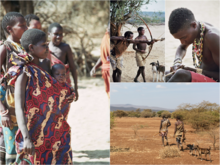
Back هادزا Arabic Хадза Byelorussian Хадзапи Bulgarian Hadzové Czech Hadsa Welsh Hadza German Hadzoj Esperanto Pueblo hadza Spanish Hatsad Estonian Hadzat Finnish
This article has multiple issues. Please help improve it or discuss these issues on the talk page. (Learn how and when to remove these template messages)
|
Wahadza | |
|---|---|
 Hadaza in Karatu District, Arusha Region | |
| Total population | |
| 1,200–1,300[1] | |
| Regions with significant populations | |
| Languages | |
| Hadza, Isanzu, Sukuma & Swahili | |
| Related ethnic groups | |
| None known[2] |
The Hadza, or Hadzabe (Wahadzabe, in Swahili),[3][4] are a protected hunter-gatherer Tanzanian indigenous ethnic group from Baray ward in southwest Karatu District of the Arusha Region. They live around the Lake Eyasi basin in the central Rift Valley and in the neighboring Serengeti Plateau. As of 2015, there are between 1,200 and 1,300 Hadza people living in Tanzania. However, only around 400 Hadza still survive exclusively based on the traditional means of foraging.[1][5] Additionally, the increasing impact of tourism and encroaching pastoralists pose serious threats to the continuation of their traditional way of life.[6][7]
- ^ a b Skannes, Thea (2015). "Notes on Hadza cosmology: Epeme, objects and rituals". Hunter Gatherer Research. 2 (1): 247–267. doi:10.3828/hgr.2015.13.
- ^ Cite error: The named reference
Tishkoff et al 2007was invoked but never defined (see the help page). - ^ In the Hadza language, hazabee [ɦad͜zabeʔe̥] is the feminine plural form of haza 'human being'. The Hadza call themselves the hazabee 'people' and their language hazane 'as the people'. Other spellings in English are Hadzapi (from hazaphii [ɦad͜zapʰiʔi̥] 'they (male) are people') and Hatsa; other ethnonyms applied to the Hadza include Tindiga (from Swahili; human plural Watindiga), Kindiga, Kangeju (with a German j) and Wahi (with a German w). In current English usage, Hadza is the most commonly used term.
- ^ Marlowe 2010, p. 15
- ^ Marlowe, Frank (2002). "Why the Hadza are Still Hunter-Gatherers" (PDF). Ethnicity, Hunter-Gatherers, and the "Other": Association or Assimilation in Africa: 247–275.
- ^ Marlowe 2010, p. 13
- ^ Peterson 2013